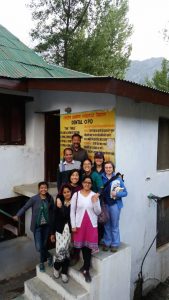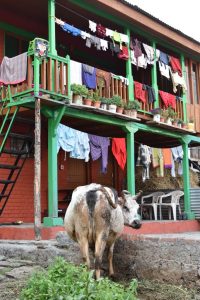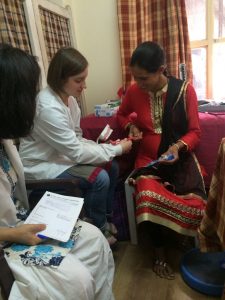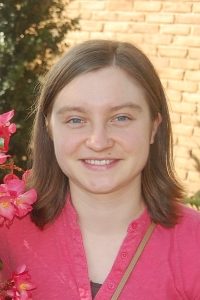Mennonite Health Journal
Articles on the intersection of faith and health
Mennonite Health Journal, Vol. 18, No. 7, September 21, 2016 PDF
Steven Roth Memorial Grant Program Project Report
Lyubov Slashcheva, DDS
May-June 2016 in Northern India
Nearly two years before I was born, the Roth family grieved the loss of their son to undifferentiated adeno-carcinoma. As a medical student, Steven J. Roth enthusiastically embraced the seal of the Kingdom on his life, planning to devote his medical career to stateside and foreign health ministry. His family and friends honored Steven by establishing a tangible ongoing influence representing these wishes through a memorial fund which provides for Steven Roth Memorial Grant Program. Now, over 25 years later, I have been granted the opportunity to take part in Steven’s legacy, reflecting the way of Jesus to which we are all called to devote our unique gifts and circumstances.
 I grew up experiencing ministry as a way of life as the youngest child within a pastoral family. I grounded this worldview in scholarly and vocationally relevant ways at Eastern Mennonite University. At Virginia Commonwealth University School of Dentistry, I sought to complement my dental training with opportunities to utilize these newly acquired skills in ways that contribute to the common good. Various settings in Latin America warmly welcomed this intention on numerous spring, summer, and winter break visits, as did the Spanish-speaking patients who represented over 70% of my patient pool in Richmond, Virginia.
I grew up experiencing ministry as a way of life as the youngest child within a pastoral family. I grounded this worldview in scholarly and vocationally relevant ways at Eastern Mennonite University. At Virginia Commonwealth University School of Dentistry, I sought to complement my dental training with opportunities to utilize these newly acquired skills in ways that contribute to the common good. Various settings in Latin America warmly welcomed this intention on numerous spring, summer, and winter break visits, as did the Spanish-speaking patients who represented over 70% of my patient pool in Richmond, Virginia.
Further seeking to authentically represent Christ in the care of my patients within a more intentional mission setting, I encountered an organization that supports incarnational ministry of professionals in regions where few to no living examples of Christianity exist. Thus, in my transition this summer from dental school into residency, I accepted a month-long placement in Northern India, where I was to join two long-term partners volunteering at a mission hospital.
The first two weeks were spent at 12-15,000 feet elevation, reinforcing the care that regional government hospitals provide to remote communities along the Himalayan Mountain range. The authentic and devout spirituality of the diverse Tibetan Buddhist and indigenous Hindu communities inspired me in two ways. First, it prompted me to revitalize my understanding of being a disciple of Jesus in a culturally diverse world. Secondly, it encouraged me to live out my convictions with joy for the universality of God’s grace for all nations.
 I was particularly moved by the often harsh scarcity of water, food, and other resources for daily life, and especially for the provision for health care, against the backdrop of contently joyous and optimistically thriving communities. It brought to mind Habakkuk’s manifesto (3:17-19): “Though the fig tree does not blossom, and no fruit is on the vines…yet I will rejoice in the LORD; I will exult in the God of my salvation….”
I was particularly moved by the often harsh scarcity of water, food, and other resources for daily life, and especially for the provision for health care, against the backdrop of contently joyous and optimistically thriving communities. It brought to mind Habakkuk’s manifesto (3:17-19): “Though the fig tree does not blossom, and no fruit is on the vines…yet I will rejoice in the LORD; I will exult in the God of my salvation….”
I also became aware of the influence of Moravian missionaries from centuries past on this region’s growing potato and apple industries as well as the increased literacy and education among the people. Hints of pseudo-European clothing styles also testified to the goodness of the work that is being carried out to completion (Philippians 1:6). This testimony is an ongoing encouragement for those who seek to do good by sharing the holistic gospel message even while being susceptible to feeling weary or faint (Galatians 6:9).
 Descending to the foothills of the Himalayas for a subsequent two weeks on the mission hospital campus, I partnered across departments to do a number of projects. I integrated oral health education into prenatal visits. I visited a local Buddhist boarding school to provide preventive oral care and education to over 300 children. Throughout the process, I celebrated as an observer both the challenges and accomplishments of the hospital’s 80-year ministry.
Descending to the foothills of the Himalayas for a subsequent two weeks on the mission hospital campus, I partnered across departments to do a number of projects. I integrated oral health education into prenatal visits. I visited a local Buddhist boarding school to provide preventive oral care and education to over 300 children. Throughout the process, I celebrated as an observer both the challenges and accomplishments of the hospital’s 80-year ministry.
Engaging with the local church raised my awareness in a number of ways. The privilege of belonging to the body of Christ was made evident both through the shared sacraments of communion and baptism. At the same time, the fallibility of Christians throughout history is seen in the post-colonial church structures and practices that remain in tension with cultural realities, keeping many at a distance from joining this fellowship of believers. Interacting with non-believing staff and foreign/local medical student interns encouraged me to define my faith-guided vocational intentions more boldly and consciously.
Sharing the ambitions of Steven J. Roth, I’m thankful to have explored the intricacies of uniting my role as an oral healthcare professional with holistic mission as a disciple of Jesus. As I begin three years of rigorous residency training in Geriatric & Special Needs Dentistry and Dental Public Health at the University of Iowa College of Dentistry, I accept the challenge to guard what has been entrusted unto my care (1 Timothy 6:20), for “That is why we labor and strive, because we have put our hope in the living God, who is the Savior of all people, and especially of those who believe” (1 Timothy 4:10).
More photos and reflections from Lyubov’s experience may be found on her blog site.
About the author
 Lyubov Slashcheva, DDS graduated in 2016 from Virginia Commonwealth University (VCU) School of Dentistry in Richmond, Virginia. After completing her undergraduate studies at Eastern Mennonite University in 2011, she interned with the Luke Society in Honduras and Peru for four months in a public health service role. She was a National Health Service Corps Scholar and has engaged in research and service opportunities pertaining to Latino, geriatric and special needs populations. She has received numerous honors for her research and service endeavors and during her student years held leadership positions on the VCU campus, including the Christian Medical and Dental Associations chapter. In the spring of 2016, she moved to Iowa City, Iowa where she is in residency and doing postgraduate training in dental public health. She has also been active in leading worship/ music/ children’s education in her local congregation, and is a committed cyclist for commuting. She enjoys playing the flute, reading, and learning about different cultures. She anticipates four years of public health practice in an underserved setting following her studies.
Lyubov Slashcheva, DDS graduated in 2016 from Virginia Commonwealth University (VCU) School of Dentistry in Richmond, Virginia. After completing her undergraduate studies at Eastern Mennonite University in 2011, she interned with the Luke Society in Honduras and Peru for four months in a public health service role. She was a National Health Service Corps Scholar and has engaged in research and service opportunities pertaining to Latino, geriatric and special needs populations. She has received numerous honors for her research and service endeavors and during her student years held leadership positions on the VCU campus, including the Christian Medical and Dental Associations chapter. In the spring of 2016, she moved to Iowa City, Iowa where she is in residency and doing postgraduate training in dental public health. She has also been active in leading worship/ music/ children’s education in her local congregation, and is a committed cyclist for commuting. She enjoys playing the flute, reading, and learning about different cultures. She anticipates four years of public health practice in an underserved setting following her studies.
